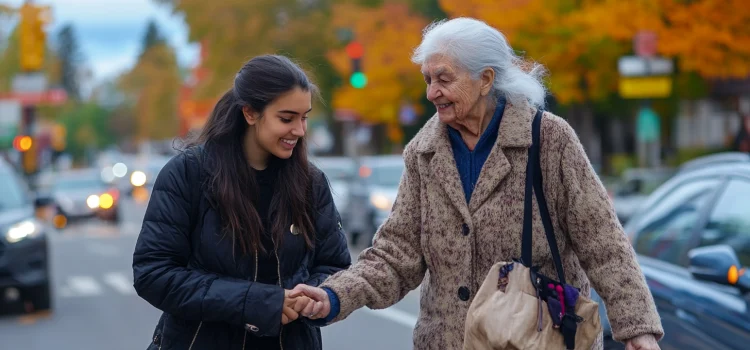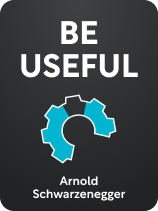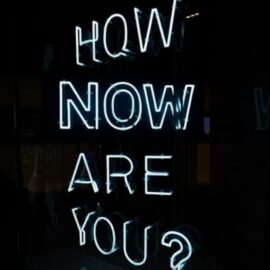

This article is an excerpt from the Shortform book guide to "Be Useful" by Arnold Schwarzenegger. Shortform has the world's best summaries and analyses of books you should be reading.
Like this article? Sign up for a free trial here.
What are the benefits of helping others? How did Arnold Schwarzenegger find joy in boosting other people up?
Arnold Schwarzenegger’s governorship shows that success doesn’t ride on the shoulders of one person. All of our accomplishments are collective endeavors built upon mutual aid and support.
We’ll explain why helping others will ultimately result in personal achievements and moral rewards.
Lift Others With Your Efforts
Schwarzenegger emphasizes that we should reciprocate the help we receive from those around us by uplifting others whenever possible. One of the benefits of helping others is that it’s a force that elevates both you and society at large. Dispelling competitive notions of success, Schwarzenegger depicts life as a cooperative game where everyone benefits from mutual assistance.
(Shortform note: Western culture holds contradicting views regarding competition—some people believe it’s responsible for society’s success, while others believe it’s divisive. In The Inner Game of Tennis, W. Timothy Gallwey offers a middle ground. He writes that if we don’t use competition to define our self-worth, then “winning” is only valuable if it helps you achieve a meaningful goal. Your opponent is therefore a valuable ally because they’re doing their best to be a difficult obstacle, helping you improve your skills. In this way, competition is a form of cooperation. Each competitor benefits from the other’s attempts to make goals difficult.)
Schwarzenegger is clear that “pulling yourself up by your bootstraps” is nonsense. Any success you achieve doesn’t happen by itself. Every step forward is made possible by someone else’s teaching or guidance. Achieving our dreams is a collective process that not only shapes one person’s future but also sets the stage for the accomplishments of others. Even if your past was tough or unpleasant, it shaped you into a survivor, which in itself is instrumental for success. This interconnected nature of accomplishment underscores why we should reciprocate the efforts of those who helped us succeed by lifting others up when we’re able.
(Shortform note: In First Things First, Stephen R. Covey points out that the interconnectedness of human lives goes deeper than the mutual achievement Schwarzenegger talks about. After all, if you think about your most important goals, you’ll probably find that most of them relate in some way to other people. For example, if you want to get promoted at work, it may be rooted in a desire for your family’s financial security or a personal wish for the respect of your peers. In fact, nearly every role you play depends on others—being a parent, spouse, sibling, child, employee, friend, or community member can only make sense in the context of other people.)
The Highest Accomplishment—Helping Others
Helping others isn’t only morally rewarding—it elevates you and society around you. Schwarzenegger insists that life isn’t a game where one person’s success means someone else’s loss. In fact, it’s quite the opposite—when you extend help to others whether in your career, your friends and family circle, or even just as part of a hobby you’re engaged in, it creates a positive feedback cycle that benefits everyone involved. If you find yourself struggling with how to help others, simply start with small gestures of kindness. You might be surprised to discover how much value and assistance you can offer—be it through sharing your skills or simply dedicating time to help a stranger in need.
(Shortform note: Schwarzenegger’s feedback cycle of kindness, which extends to people outside your immediate family and social circle, is a trait that seems to be unique to humankind. In The Happiness Hypothesis, Jonathan Haidt calls this the reciprocity reflex, through which humans, unlike other animals, work with, care for, and protect people with whom they have minimal or no blood relation. This impulse is so deeply ingrained that we hardly think about it, yet we practice it all the time. From an evolutionary perspective, this altruistic behavior increases everyone’s chance of survival, creating networks of mutual obligation.)
Schwarzenegger learned the joy of helping others when he began working with the Special Olympics. There, he witnessed the courage and perseverance of the disabled athletes who competed, especially considering the hurdles these individuals overcame daily. When Schwarzenegger took time to coach them through basic weightlifting routines, he saw their initial trepidation melt away as they tapped into new reserves of strength. Schwarzenegger says he discovered that helping people unlock their potential represents the truest measure of success. Working to inspire the Special Olympians taught him that real greatness lies in our power to elevate society itself through acts of selfless compassion.
(Shortform note: Schwarzenegger’s ongoing involvement with the Special Olympics continues to reinforce his belief in helping others as well as his view that the Special Olympics is a unifying force that promotes positivity and learning from Special Olympians’ courage and compassion. Overall, Schwarzenegger continues to champion inclusivity within sporting communities, signaling that sport is not merely about competition but an avenue for promoting unity and mutual respect among diverse individuals despite societal barriers.)
In conclusion, Schwarzenegger states that by reflecting on how other people have helped you and repeating those acts of kindness for someone else, you can make a significant difference in the world while at the same time turbocharging your personal growth.
| Making a Practical Contribution Living up to Schwarzenegger’s challenge to make a difference in the world through your actions might seem out of reach to some readers. In Minimalism, Joshua Fields Millburn and Ryan Nicodemus offer practical advice on how to make the most meaningful contributions with the time and resources you have. Though many people give money to charity because they feel they don’t have time to volunteer, Millburn and Nicodemus insist that the personal contact and satisfaction you get from doing hands-on work is more rewarding. To start, they suggest that you visit the website VolunteerMatch to see which organizations in your area are looking for help. You should explore different organizations until you find the one that’s right for you, and you can serve in a variety of ways so you don’t get bored and lose motivation. However you decide to contribute, periodically ask yourself how what you are doing adds value to the world and whether you could help more effectively in other ways. Over time, you’ll learn to replace contributions that don’t add value to your life or those of others’ lives with efforts that make better use of your skills. |

———End of Preview———
Like what you just read? Read the rest of the world's best book summary and analysis of Arnold Schwarzenegger's "Be Useful" at Shortform.
Here's what you'll find in our full Be Useful summary:
- Arnold Schwarzenegger’s unique perspective on success
- Why Schwarzenegger gravitated toward a life of public service
- How to treat life as a cooperative game and lift others up with your efforts






